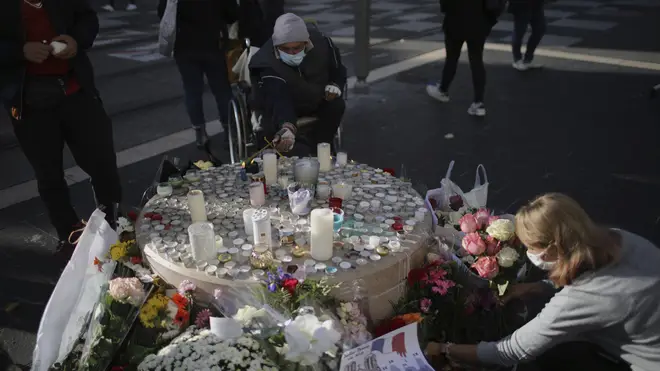
Tom Swarbrick 4pm - 6pm
30 October 2020, 17:14

Emmanuel Macron has called up thousands of reserve soldiers to protect France and reinforce security at French sites abroad.
Mourners have lit candles and prayed silently to honour three people killed in a knife attack at a church, as France heightened security at potential targets amid outrage over its defence of cartoons mocking the prophet of Islam.
The attacker, who had recently arrived in Europe from Tunisia, is in hospital with life-threatening wounds, and investigators in France and his homeland are looking into his motives and connections, although authorities have said he acted alone.
Tunisian anti-terrorism authorities opened an investigation into an online claim that the attack on the Notre Dame Basilica in the Mediterranean city of Nice was staged by a previously unknown Tunisian extremist group.
From Pakistan to Lebanon, Muslims held more protests on Friday to show their anger at caricatures of the Prophet Muhammad that were recently republished in a French newspaper as well as at French President Emmanuel Macron’s staunch defence of that decision and strong stance against political Islam.
He has called up thousands of reserve soldiers to protect France and reinforce security at French sites abroad. Interior Minister Gerald Darmanin said the country is “at war” with Islamist extremists, and a conservative legislator for the Nice region called for a “French-style Guantanamo” to lock up terrorist suspects.
Many French Muslims denounced the killings but warned against stigmatising the country’s peaceful Muslim majority.
While investigators sought to develop a picture of the attacker, identified as Ibrahim Issaoui, they detained a second suspect, a 47-year-old man believed to have been in contact with Issaoui the night before, according to a judicial official.
Issaoui’s mother told Tunisian investigators her son led a “normal life” for his age, drinking alcohol and dressing casually, and started praying two years ago but showed no suspicious activity, said Mohsen Dali, a spokesman at the Tunisian anti-terrorism prosecutor’s office.

He said Issaoui was not flagged for radicalism and decided on September 14 to emigrate illegally to Italy — after a failed first attempt — and reached Nice the day before the attack. Before Nice, Issaoui, who was born in 1999, arrived on the Italian island of Lampedusa on September 20, France’s anti-terrorism prosecutor said.
Mr Dali said an online post claimed the attack was staged by a group called Al Mehdi of Southern Tunisia, previously unknown to Tunisian authorities.
Issaoui’s mother Qamra earlier told Saudi-owned Al-Arabiya TV that she was surprised to hear her son was in France when he called on his arrival, and had no idea what he was planning.
“You don’t know the French language, you don’t know anyone there, you’re going to live alone there, why, why did you go there?” she recounted telling him.
His brother told Al-Arabiya that Issaoui had said he would sleep in front of the church, and sent a photograph showing him at the basilica in Nice. A neighbour said he knew the assailant when he was a mechanic and held various odd jobs, and had shown no signs of radicalisation.

Tunisians fleeing a virus-battered economy make up the largest contingent of migrants landing in Italy this year. Italian media reported that when he arrived, Issaoui was placed with 800 others on a virus quarantine boat.
As France entered a new virus lockdown on Friday, soldiers with rifles periodically walked past the church in Nice, and mourners placed flowers, messages and candles at the entrance, crossing themselves and praying silently for the three victims.
They included 55-year-old church warden Vincent Loques, a father of two. Arahmi Ihou, owner of an internet cafe next door, mourned him as someone who was “nice to everyone — people (of) all nationalities”.
Another victim was Brazilian-born Simone Barreto Silva, a 44-year-old mother of three who moved to France to join a dance group led by her sister and worked in elder care, according to Brazilian media portal G1.
The attack was the third in less than two months that French authorities have attributed to Muslim extremists, including the beheading of a teacher who had shown caricatures of the Prophet Muhammad during a civics lesson after the images were republished by satirical newspaper Charlie Hebdo.